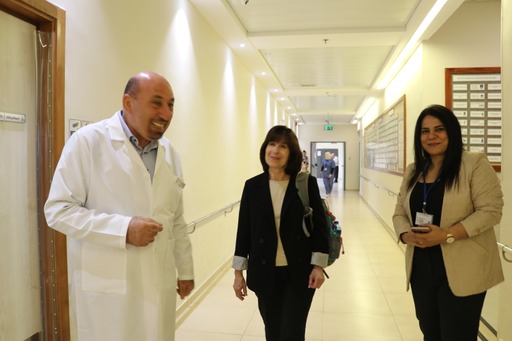The American Friends of the Episcopal Diocese of Jerusalem (AFEDJ) has proudly supported the Jerusalem Princess Basma Centre (JPBC) for many years, a relationship that continues to thrive in extraordinary ways. This enduring collaboration was recently brought to life by a deeply meaningful visit from Eileen Spencer, AFEDJ’s Executive Director. During her visit, Eileen toured JPBC’s facilities in East Jerusalem, connected virtually with the resilient satellite team at Al Ahli Arab Hospital (Ahli) in Gaza, and visited the Noor Center for Disabilities in Aida Refugee Camp, a key partner in JPBC’s outreach efforts. Each visit highlighted the critical work being done to support Palestinian children with disabilities and their families despite increasingly complex circumstances.
For Eileen, one of the most powerful aspects of her visit was connecting virtually with JPBC staff members in Gaza. Even from afar, the team’s joy and resilience were palpable. Staff members in both Gaza and East Jerusalem were overjoyed that AFEDJ made the effort to be present, affirming that they are not alone and remain a priority. Despite the challenges they face, the team was eager to share how they created a safe and welcoming space for children at Ahli using furniture and equipment salvaged from beneath the rubble following airstrikes on the building. Dr. Waddah Malhees, JPBC’s Medical Director, shared the heart-wrenching story of a five-year-old girl who lost both parents and had to undergo amputation from the waist down. Yet, there she was, sitting in the JPBC clinic at Ahli, smiling with a thumbs up—a testament to the extraordinary resilience of these children and the profound impact of JPBC’s work.
Violette Mubarak, General Director of JPBC, expressed heartfelt gratitude for AFEDJ’s unwavering support, noting how crucial this collaboration has been, especially in these trying times. Violette spoke on the growing demand for JPBC’s services in Gaza: “With the increase in both physical and psychosocial needs among children in Gaza, our work has become even more crucial. We are determined to provide comprehensive rehabilitation services to support these children achieving a better quality of life.” The JPBC team is strategizing to meet this increased demand, while also addressing the needs of children in East Jerusalem and the West Bank.
Eileen spoke on the importance of sustained support, remarking, “It’s truly inspiring to see JPBC’s work continue despite significant challenges. It’s crucial that this support persists so that Palestinian children with disabilities can access the care and hope they deserve.” Her words reflect AFEDJ’s mission: to empower and uplift the Episcopal Diocese of Jerusalem’s humanitarian institutions through the generosity of donors.
This visit also underscored the bigger picture—how AFEDJ’s support of the diocese as a whole, through mobilizing resources towards urgent priorities, benefits all its institutions. Highlighting the remarkable efforts of one institution strengthens the entire diocese, laying a stronger foundation for future growth.
As we reflect on this visit and the long-standing partnership between AFEDJ and the Episcopal Diocese of Jerusalem, the need for unrestricted donor support is more evident than ever. Your contributions enable us to respond flexibly and effectively to the immense needs across the region, providing critical resources where they are most needed. Every gift to AFEDJ directly supports transformative work at institutions like JPBC, Ahli Hospital, and many others, ensuring that those in need can lead lives filled with dignity, opportunity, and hope.
By:afedj






